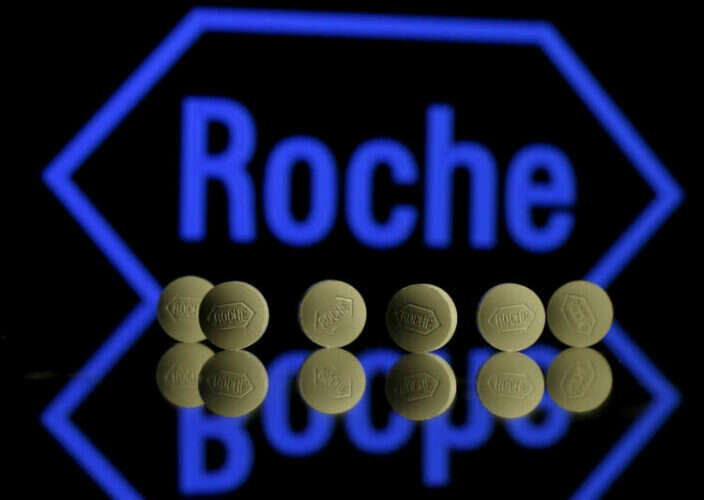By Ludwig Burger
BASEL (Reuters) – Roche warned of a decline in 2023 earnings, as revenue growth from new drugs, including its haemophilia treatment and multiple sclerosis drug, would not make up for a steep demand drop for COVID-19 treatments and diagnostic testing.
Sales and core earnings per share were expected to decrease at a “low single-digit” percentage this year, the Swiss pharmaceuticals and diagnostics company said in a statement on Thursday.
The demise of COVID related sales, mainly from lab testing and antibody treatment Ronapreve, would pose a 5 billion Swiss franc ($5.5 billion) burden on this year’s revenues, but “the underlying business is growing very strongly in the high single digits,” said Chief Executive Severin Schwan.
The pivot away from the coronavirus pandemic, which has dominated the agenda of most healthcare companies over the past three years, also weighed on rival diagnostics group Siemens Healthineers, which reported a 28% drop in quarterly operating profit.
Shares were down 1.3% at their lowest since March 2020 in early trading.
Last year, Roche group revenue edged 1% higher to 63.3 billion Swiss francs, the company reported, beating market expectations of 63.2 billion francs, while core operating profit gained 1% to 22.2 billion Swiss francs, just shy of the average analyst estimate of 22.4 billion francs.
Analysts have said that market confidence in Roche’s drug development abilities, previously among the highest in the industry, has taken a blow from trial setbacks last year in Alzheimer’s disease and a cancer immunotherapy hopeful.
As a result, the stock has fallen about 11% over the past three years, lagging its key global rivals.
Roche has lagged rivals https://fingfx.thomsonreuters.com/gfx/mkt/myvmokkmmvr/roche.PNG
REINVIGORATE PIPELINE
The onus to reinvigorate the pipeline will be on chief executive officer-designate Thomas Schinecker, who was previously Roche’s head of diagnostics and due to be promoted to group CEO in March.
In the wake of Schinecker’s appointment, the head of Roche’s pharmaceuticals division, Bill Anderson, decided in December to leave after 16 years with the Swiss drugmaker.
Family-controlled Roche said on Thursday that Teresa Graham, currently Head of Global Product Strategy for Roche Pharmaceuticals, would succeed Anderson.
Speaking in a media call, CEO Schwan said the company was analysing the failed trials thoroughly, but structural changes in research and development (R&D) were not called for, despite the planned changeover in management.
“I don’t see any change in the strategic direction. We believe that our strategy, which is very focused on innovation both in pharma and diagnostics and is driving more personalized healthcare solution, remains valid,” said Schwan, who will take the role of chairman of the board.
Roche is not alone. Analysts were disappointed on Wednesday that GSK did not give more details on how one of the world’s top drugmakers plans to find its next set of blockbuster drugs.
Roche’s bestseller multiple sclerosis drug Ocrevus gained a currency-adjusted 17% in sales to just over 6 billion francs during the year, while its haemophilia treatment Hemlibra jumped 27% to 3.8 billion francs, both slightly above market expectations.
The near-term commercial performance will depend on newly launched drugs such as Evrysdi, an oral drug against muscle-wasting disease spinal muscular atrophy (SMA), and Vabysmo against a common cause of blindness in the elderly.
Schwan pointed in particular to Vabysmo, with 591 million francs in its market debut year. “It was one of the best launches ever in the history of Roche,” said Schwan.
($1 = 0.9079 Swiss francs)
(Reporting by Ludwig Burger; Editing by Paul Carrel, Rashmi Aich and Josephine Mason)
